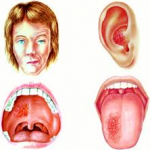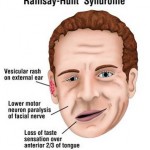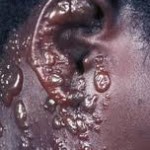Ramsay Hunt syndrome is a painful rash around the ear that occurs when the varicella zoster virus infects a nerve in the head. This syndrome is also known as geniculate neuralgia or nervus intermedius neuralgia. Ramsay Hunt syndrome can also occur in the absence of a skin rash, condition known as zoster sine herpete.
 Ramsay Hunt syndrome was first described in 1907 by James Ramsay Hunt in a patient who had otalgia associated with cutaneous and mucosal rashes, which he ascribed to infection of the geniculate ganglion by human herpesvirus 3 (ie, varicella-zoster virus [VZV]).
Ramsay Hunt syndrome was first described in 1907 by James Ramsay Hunt in a patient who had otalgia associated with cutaneous and mucosal rashes, which he ascribed to infection of the geniculate ganglion by human herpesvirus 3 (ie, varicella-zoster virus [VZV]).
Causes, incidence, and risk factors
The varicella zoster virus that causes Ramsay Hunt syndrome is the same virus that causes chickenpox (varicella) and shingles.
In people with Ramsay Hunt syndrome, the virus is believed to infect the facial nerve near the inner ear. This leads to irritation and swelling of the nerve.
Symptoms
- Painful rash on the eardrum, ear canal, earlobe, tongue, roof of the mouth (palate) on the same side as weakness of the face
- Hearing loss on one side
- Sensation of things spinning (vertigo)
- Weakness on one side of the face
- Difficulty closing one eye
- Difficulty eating (food falls out of the weak corner of the mouth)
- Difficulty making expressions, grimacing
- Difficulty with fine movements of the face
- Facial droop
- Paralysis of one side of the face
Is Ramsey Hunt syndrome contagious?
 The syndrome is not contagious; however, the herpes zoster virus that can be found in the blisters of Ramsay Hunt syndrome can be transmitted to other people and cause chickenpox in those that are unvaccinated against chickenpox. Individuals with Ramsay Hunt syndrome should avoid contact with newborns, pregnant women, immunodepressed individuals, and people with no history of chickenpox, at least until all the blisters change to scabs.
The syndrome is not contagious; however, the herpes zoster virus that can be found in the blisters of Ramsay Hunt syndrome can be transmitted to other people and cause chickenpox in those that are unvaccinated against chickenpox. Individuals with Ramsay Hunt syndrome should avoid contact with newborns, pregnant women, immunodepressed individuals, and people with no history of chickenpox, at least until all the blisters change to scabs.
Signs and tests
The doctor will usually make the diagnosis by looking for signs of weakness in the face and a blister-like (vesicular) rash.
Tests may include:
- Blood tests for varicella zoster virus
- Electromyography (EMG)
- Lumbar puncture
- MRI of the head
- Nerve conduction (to determine the extent of damage to the facial nerve)
- Skin tests for varicella zoster virus
Treatment
Strong anti-inflammatory drugs called steroids (such as prednisone) are usually prescribed for 5 – 7 days. Antiviral medications, such as acyclovir or valacyclovir, can be given for 7 – 10 days, although the benefit of antiviral medications is uncertain.
Sometimes strong painkillers are also needed if the pain continues even with steroids. While you have weakness of the face, wear an eye patch to prevent injury to the cornea (corneal abrasion) and damage to the eye if it does not close completely.
If you have dizziness (vertigo), your health care provider can recommend other medications.
Expectations (prognosis)
 The more severe the damage, the longer it will take to recover, and the lower the chance that you will completely regain normal function. If there is not much damage to the nerve, then you should get better completely within a few weeks. If damage is more severe, you may not fully recover– even after several months.
The more severe the damage, the longer it will take to recover, and the lower the chance that you will completely regain normal function. If there is not much damage to the nerve, then you should get better completely within a few weeks. If damage is more severe, you may not fully recover– even after several months.
Overall, chances of recovery are better if the treatment is started within 3 days of when the symptoms begin. If treatment is started at this time, 70% of patients make a full recovery.
However, when the treatment is delayed more than 3 days, the chances of complete recovery drop to about 50%. Children are more likely to have a complete recovery than adults.
Recovery may be complicated if the nerve grows back to the wrong areas (synkinesis), which may cause inappropriate responses, such as tears when laughing or chewing (crocodile tears). Some other people may experience blinking of the eye when they talk or chew food.
Complications
- Changes to the appearance of the face (disfigurement) from loss of movement
- Changes to taste
- Damage to the eye (corneal ulcers and infections)
- Nerves that grow back to the wrong structures (aberrant regeneration) — for example, smiling causes the eye to close
- Persistent pain (postherpetic neuralgia)
- Spasm of the face muscles or eyelids
Occasionally, the virus may spread to other nerves, or even to the brain and spinal cord, causing:
- Confusion
- Drowsiness (lethargy)
- Headaches
- Limb weakness
- Nerve pain
This may require a hospital stay. A spinal tap may help determine whether other areas of the nervous system have been infected.
Calling your health care provider
Call your health care provider if you lose movement in your face, or you have a rash on your face that occurs with facial weakness.
Prevention
There is no known way to prevent Ramsay Hunt syndrome, but taking medication early in the course of the symptoms can improve recovery.